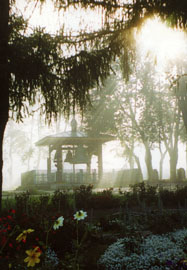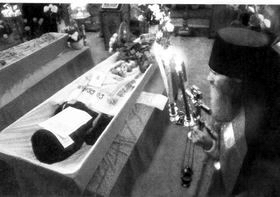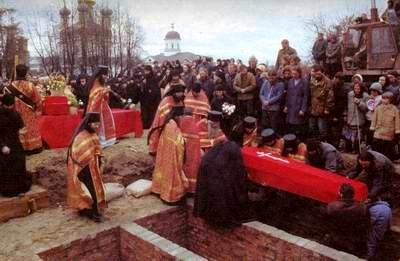From 'Orthodoxy and the World' www.pravmir.com
Optyna martyrs
By
Jun 21, 2006, 23:18
In the year 1993 the whole
Orthodox world was shocked by a tragic event, which had happened in
Optina Hermitage: three inhabitants of the monastery were brutely
murdered on Easter night. They were hieromonk Vasily (Roslyakov), monk
Ferapont (Pushkarev) and monk Trophim (Tatarinov).
The Easter
service in Optina began as usual. According to the existing tradition,
the religious procession to the skete of St. John the Baptist,which is
situated to the east of the Monastery, and back was coming to an end.
The festive Easter peal was heard coming from monastery and skete
belfries. The number of people was enormous—up to 10 thousand people
(as the militia later reported, which were guarding the Monastery
during the festive service,). After the Liturgy the monks went to the
refectory to break the fast. After completing the meal, two of the
bell-ringers, monk Ferapont and monk Trophim, returned to the belfry to
continue the Easter peal. By then it was ten past six. Suddenly the
bell ringing became uneven and then stopped completely. A terrible
crime was committed on the belfry—the monks were villainously killed
with stabs from a knife.
Monk Ferapont expired at once. After
the stabbing Monk Trophim uttered a loud shriek: “God, have mercy upon
us!” and “Help!; having risen a bit, he rang the bell—and fell down.
The
murderer ran away to the skete, where hieromonk Vasily was also
going in order to hear confessions. The criminal stabbed him in the
back with the same knife.
Then the murderer climbed over the
monastery wall and threw away a blood-stained self-made knife. It was
double-edged, five centimeters wide, and resembled a sword. It was
engraved on its blade with “ 666” and “satan”. The same inscription was
found later on a knife in the pocket of a greatcoat that was abandoned
by the murderer.
The murderer Nikolay Averin inflicted knife
wounds to the back. According to the investigator, the injuries were
inflicted with unusual professionalism “and deliberately—they were not
too deep—to make the victim bleed to death over a long time”. In fact,
hieromonk Vasily suffered for several hours, though monks Trophim and
Ferapont died immediately.
Averin killed monks Ferapont and
Trophim while they were announcing to the world on the belfry the
Resurrection of Christ. And hieromonk Vasily was killed when he was
going to the skete to hear confessions. Having committed the murder,
Averin slipped the edge of the monks’ robes to their heads and pulled
their klobuks over their faces.
It seemed that there was still
life in monk Trophim. He was brought to Vvedensky Cathedral, but a few
minutes later he passed away.
In spite of a terrible wound, Hieromonk Vasily lived longer than the
others. He looked at the people surrounding him and even tried to rise.
He was also brought to the Cathedral and was put next to the relics of
St. Elder Ambrose, and then he was taken by ambulance to the local
hospital in Kozelsk. There he soon passed away.
It was also surprising that the monks began to give away their
possessions before their murder, including their personal tools, saying
they would not need them any more (which was all the more unusual at
the time when there was such a lack of tools in the monastery that one
had to bring them from home or get them somehow through friends,
otherwise one could not do his work). Everyone in Optina monastery was
surprised by this occurance, but after the murder it became clear: the
monks had foreseen the glory of martyrdom prepared for them.
To understand why the monks were ready to die, it is necessary to know what kind of life they lived.
For more than ten years people in Optina monastery have been collecting information about monks Trofim, Ferapont and Vasily.
A Joyful Ascetic
 |
| Monk Trophim |
Leonid
Tatarnikov, the future monk Trofim, was born in the village of Dagon ,
Irkutsk region, on the 4th of February, 1957. When he was a baby he
cried day and night incessantly for almost two years, so that some
people thought he was unlikely to survive. But he became quiet as soon
as he was baptised, and since then became a smiling healthy boy.
Leonid grew into a tall beautiful young man, and girls liked him.
Besides being handsome, he was erudite (he would read all night long,
and was even nicknamed Bookworm), hard-working and never touched
alcohol. Girls tried hard to marry him, some even turned to magic. One
of them actually told him, "either you will be mine, or no one's!" But
Leonid stayed calm and had but one word to address a girl: "sister". He
was a born monk, but he understood it much later.
Having finished secondary school, Leonid studied in a railway
services college. After completing his service in the army he worked as
a sailor on a trawler.
When Leonid was getting a foreign passport, for some reason he
changed his name and became Alexey. Alexey tried quite a number of
occupations: photography, horse-breeding for a local horse farm, and
shoe-making (the shoes he made were such that everyone in the town
queued to get a pair). He was a member of various hobby groups, such as
a yacht-club, wrestling and karate societies, as well as classical and
folk dance schools. He was very flexible. At thirty years of age he
could still do the splits without straining. Together with his sister
Natasha, Alexei studied in a classical dance school and won prizes in
competitions. Once he was even offered to enter into a contract and
become a professional dancer, but he refused.
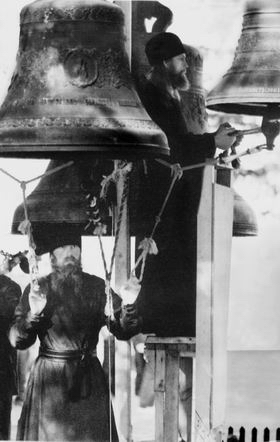 |
| Monks Ferapont and Trophim |
The future monk was looking
for the meaning of life and still could not understand what was
lacking. He took up "well-being" and even gave up eating meat. In his
room there hung a time-table according to which Alexei went without
food for ten days twice a month in the vain hope to give up smoking (he
took to smoking at a very early age). Then he began to go to church,
and the priest told him he had to choose between God and nicotine.
Alexei finally rid himself of his long-term habit.
How on
earth could this cruel man of an unknown build overpower three monks?!
And what monks! Monk Trophim could tie a poker into a knot (there was
an episode when some drivers tried to straighten out a dent in a truck
wing with a sledge-hummer, and all their attempts fell flat untill
Trophim did it with bare hands). Two-meter-high hieromonk Vasily in his
previous life was known to be one of the best water-polo players in the
country. He used to be a member of a combined team of the USSR . His
reaction time was stunning and he was famous for an amazing mighty
throw. Even while dying he was able to deliver a shattering blow. Monk
Ferapont was very good at martial art (aikido, karate).
The
committee of inquiry affirms that the whole point is the stabs were
delivered to the back. But the belfry where monks Trophim and Ferapont
were killed is rather small, and a stranger can’t get there unnoticed.
However, it’s clear to an orthodox person even without any
investigation that the monks could not requite violence using the same
violence. It was their last temptation. A real monk mustn’t bloody his
hands.
Evidently, by then monks Trophim, Vasily and Ferapont
were ready for death. According to the witness’ recollections, the
martyrs had foreseen their death. Monk Trophim had often spoken that he
had little time left – half a year, a year. While Ferapont, once a
silent monk, began asking everybody to pray for him.
On Pentecost day, 1990, Alexei had a vision. He immediately decided
to become a monk and bought a ticket to Optina monastery. But when he
was ready to leave, his passport, money and ticket were stolen, and he
made it to Optina in only a month and a half. His spiritual search
lasted a long time untill at the age of thirty-six he stayed in Optina
monastery and took monastic vows, becoming monk Trofim.
Having settled in the monastery, he found this holy place rather
neglected. The locals, who after World War II built a village on the
monastery territories, cursed this land which bore nothing, although it
had been very fertile before. Tomatoes use to grow there in such
quantities that they were given for free to anyone who asked for them.
Now the land bears fruit again. The monks have managed to cultivate
this poor soil, and the hard-working monk Trofim took part in that,
too.
The local farmers say that wherever monk Trofim planted potatoes for
old people, there were no Colorado beetles, while there were plenty of
them in the neighbouring gardens. Some people even came to the
monastery to ask what kind of prayer the monk was saying. By now some
farmers take a pinch of earth from his tomb and, having dissolved it in
water, use it to sprinkle their gardens.
Trofim valued time, and he had time for everything. His main duties
were those of senior bell-ringer, sexton and tractor operator. Besides
that, he worked as a receptionist, candle-seller, house-painter, baker;
he worked in the bookmaker's shop, in the warehouse, in the forge.
People surrounging him had a feeling that he could do everything. Only
after the murder did they learn that monk Trofim had never before been
a forger, a tractor operator, a baker, a bookmaker, and had never
learnt how to ring the bells. God made him able to do all that for his
prayers.
When they decided to bake their own bread in the Optina
monastery (in the beginning of the nineties bread supplies in Russia
were limited), the task was appointed to monk Trofim. Nobody knew how
to bake bread in the monastery. The monk had to run around to find a
receipt. But as a result his loafs were spongy, light and tasty. His
bread was called "healing" in the neighborhood. When leaving the
monastery, one businessman even asked to have the special receipt of
monastery bread. The man explained that his sick stomach did not digest
bread at all, excluding the monastery "healing" bread. They gave him
the receipt but he did not know the most important thing: how
thoroughly monk Trofim prayed on each baking and how many bows he made
in front of Icon of the Mother of God "The Grower of Crops"
["Sporitelnitsa hlebov"].
Trofim was a real monk—secret, focused
inward, and there was no external, ostentatious devotion in him. There
were no bad people in the world in his opinion, and anyone at any time
of day and night could ask him for help and would receive it. It was to
monk Trofim that everybody went asking for repairs for a watch, photo
camera or even boots.
He prayed a lot but slept little, and he
ate very modestly, limiting himself even in water. But in spite of
those restrictions he was never sick and never seemed to be tired. And
everybody in Optina got used to his perseverance. It was difficult to
imagine this strong monk, always happy and lively, to be an ascetic one
and to have a custom to eat nothing during the first and the last week
of the Great Fast.
However during the last (for Trofim) Fast one
could notice signs of fatigue in him. It was getting clear for Optina's
inhabitants that the monk was on the verge of exhaustion. As a rule, at
five in the morning, when all the monks were going to the midnight
service, it was hard to recognize faces in the darkness. But one could
always recognize monk Trofim even from a long distance because of his
flying long gait. He was hurrying to church overtaking many others on
his way. But during his final days it became hard to recognize him.
Sasha the Prosphora-maker remembered an incident, when he was slowly
going to midnight service and had overtaken somebody in the darkness.
Turning around to see who it was, he could not believe his eyes that it
was Trofim. Sasha noticed that Trofim was going so slowly and with such
effort as if he was carrying an unbearable burden.
The mother of
monk Trofim did not manage to be in time for her son's burial. When the
news of his death had come, she was being treated in a hospital after a
stroke. The doctors prohibited her from flying by airplane, so she had
to travel by train from Siberia . She came to the monastery and spent
some time there. She even wanted to stay there for good but they
blessed her to go back home and to turn to God her other children. Thus
through the death of a beloved brother and because of a mother's
efforts, her children had come to God. Once Lena , a younger sister of
the monk, saw Trofim in a dream. He looked so worn out in that dream
and had such a sorrow in his eyes that the girl shivered hearing his
voice as for real: "I'm so tired. I have worked my tail off praying for
you all but you are still not going to church." And at one time 14 of
Trofim's relatives had been baptized together.
He lived without touching the earth.
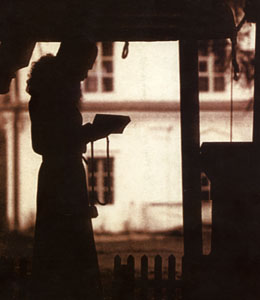 |
| Monk Ferapont |
The future monk Ferapont was
born into the world Vladimir Pushkarev on the feast of the icon of the
Mother of God “The Unburned Bush”, 1955. He was born in a remote
desolate town of the Taiga, where lumber cutting paid only
pennies, and many suffered poverty or drank. All of the workers were
unbaptised since the nearest church could only be reached by plane, and
no one had the money for that.
Everything in Vladimir ’s life was normal. He attended school, then
the army (compulsory, and then additional voluntary service), where he
learned the Eastern art of warfare, which he later discovered was mixed
with occultism. Having finished the army, he studied agriculture. After
that he worked as a technical-forester in a lumber range in Baikal. He
never drank, never smoked, and everyone respected him. But his life in
the world was made difficult because certain people considered him a
sorcerer.
It is well known that Vladimir ’s conversion occurred during his
time working as a lumber jack. They say that once and old man appeared
to Vladimir in the Taiga, who gave him a book about magic and arranged
another meeting on the same spot in a year. Vladimir did not like the
sorcerers and they did not appear for their second meeting. But he
performed magical tricks for fun for the local girls. He would send
them into some local brush and told them to write a note, which he
would then read from a distance. He was mystically gifted by nature.
His games almost ended in tragedy. According to the words of his own
friend, Vladimir lived through his own death. His soul separated from
his body and he traveled to a kingdom of terror. He died. But an angel
appeared to him and said that he would send Vladimir back earth only if
he agreed after that to go to church.
After all that Vladimir soon left the forest farm, where a church
wasn’t even hundreds of kilometers distant, and moved to the Rostov–on
Don. There, he started working as a yard–keeper in the Cathedral of the
Nativity of Virgin. It was soon noticed that he was an exceptional
faster: during Lent he would take several prosphora, crackers and a
bottle of holy water. After the service he would only eat this in the
Church behind a column.
The future monk lived in Rostov–on–Don
for three years, and on holidays he would travel around the monasteries
in search of one to stay in. At that time his decision to become a monk
had already been made and he had received the blessing of the elder
Kirill (Pavlov) of the Trinity–Sergius Lavra. Vladimir later went to
Vladika Vladimir, the present-day metropolitan of Kiev and all Ukraine
, and told him, “Vladyko, I can even clean the toilets, if only you
give me a recommendation to the monastery!”. And it turned out exactly
that the cathedral needed a person to clean the toilets. The future
monk did that for around a year, when he received a recommendation and
left the city.
He came to the Optina Hermitage from Kaluga (quite a long distance) on foot and took the veil with the name Ferapont.
Once
he had the duty to keep watch at the Holy Gate of the monastery so that
no inappropriately dressed woman would enter it. He had to give them
scarfs and work gowns. It turned out that he did not notice the women
and even didn’t realize how they were dressed. The warden was
constantly criticizing and blaming him, “can’t you see that! You must
carefully watch how they all are dressed!” But the monk was only
repeating with repentance, “forgive me, father, I haven’t reached that
perfection as to be able to look at the women! I am guilty!” Soon this
duty was taken from him.
As far as the other kinds of work are concerned, many have admired
his talent: a talent to study something new. He was doing everything
very carefully. In the monastery he became an excellent woodcarver.
Half of the Optina bretheren are wearing his paraman crosses.
Artist
Sergey Lavrov called Ferapont “Titian” for his shaped cheekbones,
bright-blue eyes and "golden curls on the shoulders ". Lavrov
recollected the day when Ferapont showed him his first work, a carved
paraman cross. The impression it produced was very strong. Today there
are, of course, elegant crosses decorated with many details. Each curl
is trimmed so gracefully, that it is possible to admire it, as an
independent picture. But the details hide the main subject, and the
skill of the artist and his pride come to the fore. In Ferapont’s work
there was modesty, severity and laconicalness—the eye at once seized
the figure of the Savior.
In Optina Ferapont is described as a
person who lived without touching the earth. Imperceptible, silent, he
was praying day and night. He had a very strong prayer indeed!
Once
a person came up to church’s warden saying that he had come to the
monastery by accident, doubting the existence of the God, and at last
he believed. " I saw here how one monk was praying,” he said, “I saw
the face of an angel talking with Lord. Do you know that there are
angels among you? " " What angels? " said the warden in surprise. The
visitor then pointed to Ferapont, who was coming out of the Church at
that moment.
The monks
also tell that, when monk Ferapont completed the monastic prayers with
a “five hundred” (500 repetitions of the Jesus prayer), not an
obligatory one for an inok, he then would still pray for a long time at
night. One of his fellow brothers had decided to count how many bows he
made during one night. The cell was divided by a curtain, and monk
Ferapont was praying in the corner, having thrown a sheepskin coat on a
floor in front of the analoy. His cellmate was counting and counting
the bows, and while counting has fallen asleep.
The hierodeacon
who lived with Ferapont in the cell related that before the death of
Ferapont, he did not sleep at all, praying all the night and found rest
while bending over a chair. Moreover during all of Passion Week he did
not eat a bite.
After he was murdered a letter was found in his
pocket. It said that "if help is needed, I shall be glad to give a
hand". It is not known yet to whom this letter was addressed.
But many believers are sure—the addressee are all those who pray for the martyr Ferapont of Optina.
Translation: A.Ljubimova, A.Martchuk, N.Volkova, L.Zholudeva, edited by fr. Savvatij (Lewis)
© Copyright 2004 by 'Orthodoxy and the World' www.pravmir.com
